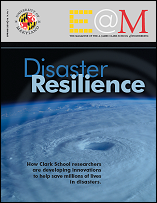What is Mpact? | Disaster Resilience | Register for Mpact Week Events
Mpact Week 2014: Disaster Resilience
 In the last decade, natural and human-caused disasters have been an all-too familiar occurrence, both in the U.S. and internationally. These disasters have led to major financial losses and human casualties. In the last decade, natural and human-caused disasters have been an all-too familiar occurrence, both in the U.S. and internationally. These disasters have led to major financial losses and human casualties.
In 2005, Hurricane Katrina left a trail of destruction in its wake, most notably in New Orleans, causing 1,833 deaths and $108 billion in damage. In 2008, after Cyclone Nargis struck Burma, 84,000 people died and 54,000 went missing, while 2.5 million people were left destitute by the storm. Less than two weeks later, nearly 70,000 people were killed when an earthquake rocked central and southern China, and an estimated 5 million people were rendered homeless. In 2010, an earthquake in Haiti resulted in 316,000 deaths, and in that same year, the largest marine oil spill in history took place at Deepwater Horizon, with an estimated 4.9 million barrels of oil discharged into the Gulf of Mexico. In 2011, an earthquake and subsequent tsunami in Japan resulted in a catastrophic failure at the Fukushima Nuclear Power Plant, and the nationwide disaster resulted in 18,500 deaths. In 2012, Superstorm Sandy ravaged the eastern seaboard, inflicting a total of $68 billion in damage. In 2013, Typhoon Haiyan killed 6,021 in the Philippines.
Recently, the U.S. Department of Homeland Security (DHS) determined that failing to prepare for extreme weather events has cost the United States $1.15 trillion in economic losses from 1980 to 2010. "According to the U.S. Global Change Research Program, future impacts of climate change project national economic losses on the order of $1.2 trillion through 2050," said Assistant Secretary for Policy at DHS David Heyman at a recent Senate hearing.
Engineers can play a significant role in developing innovative solutions to help prevent, mitigate, and respond to disasters, both natural and human-caused. University of Maryland researchers from the A. James Clark School of Engineering are actively engaged in initiatives to address disaster resilience and help our national and international communities prepare for disaster scenarios.
Clark School research innovations address areas as far-reaching as energy and sustainability, national preparedness for severe weather and storms, coastal infrastructure, fire resilience, pandemic outbreaks, unmanned aircraft systems, and other technologies aimed at providing solutions to disaster-related challenges.
This Fall, the University of Maryland is hosting our Mpact Week research showcase on the broad research theme of Disaster Resilience from Oct. 16-22, 2014. The week-long event will be co-sponsored by the Clark School and the Division of Research, and will feature keynotes, panels, and research presentations, as well as technology demos and startup venture exhibits. Some events will be held on the University of Maryland’s College Park campus, while others will be held in downtown Washington, DC to view these critical topics through a national and international lens, and to invite policy makers to attend and participate in the discussions.
Learn more
|